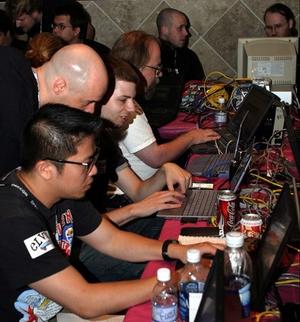CybersecurityBlack Hat opens Wednesday in Las Vegas, DefCon to follow Friday
Black Hat, one of the more important cybersecurity event, opens this Wednesday in Las Vegas; Black Hat gives way on Friday to DefCon, “Black Hat is a place where security researchers go to show off their work and get peer feedback,” said Jeff Moss, who founded and runs both gatherings; “DefCon is the fun stuff they don’t have time to do in their day jobs”; DefCon’s array of activities includes a lock picking village and a “capture the flag” contest to see who can break into a computer network and fend off rivals

Thousands of "hackers" will gather in Las Vegas for presentations and competition // Source: mccullagh.org
Internet security mavens of all stripes — or, as the New York Times’s Nick Bilton describes them, “hackers with enigmatic motives” — are gathering this week to explore vulnerabilities in computers, bank teller machines, mobile phones, power grids, and other smart devices intrinsic to modern life.
Black Hat USA kicks off in Las Vegas on Wednesday with briefings at which security professionals from technology firms including Microsoft and Cisco will dissect ways to safeguard or foil computers.
Black Hat gives way on Friday to DefCon, an infamous annual assembly of hackers that pride themselves on finding ways around computer defenses. Attendance at the events overlaps, with security professionals and software rogues sharing insights in an irreverent setting that has become a recruiting ground for U.S. law enforcement agencies.
“Black Hat is a place where security researchers go to show off their work and get peer feedback,” said Jeff Moss, who founded and runs both gatherings. “DefCon is the fun stuff they don’t have time to do in their day jobs.”
AFP reports that the topics to be discussed at Black Hat will include hacks that make automated teller machines spew cash and the vulnerability of nuclear power plants, chemical factories, and other online systems.
Hot trends are expected to include vulnerabilities of smart phones along with how hackers, and the crime fighters trying to catch them, are adapting to programs hosted as services in the Internet cloud.
“There is a continuing focus on ways the current Web works and how to attack that,” said Moss, whose hacker name is Dark Tangent. “Smartphones are a big target.”
AFP notes that attacks aimed at Internet browsers continue to grow as more aspects of people’s lives go online. Hackers are hiding malicious viruses in mini-applications, videos and other files to take advantage of the trust with which people share and download digital content.
The event has this year added panels and tracks focused on cyber war, government technology policy, and organized crime.
A “Chinese Cyber-army” presentation by the CTO of Taiwan-based Armorize Technologies was yanked by the company, reportedly due to concerns it would anger Chinese officials. “That is a shame, because they had real numbers and these guys were going to really frame the size of the problem,” Moss said of the canceled presentation of data about China-backed hacking during the past decade. “This is the environment we are all living in. We’d better have our eyes open.”
AFP’s Glenn Chapman notes that DefCon is “an order of magnitude cheaper” than Black Hat and is known for attracting the kinds of basement-dwelling computer savants portrayed as quirky geeks in Hollywood films.
Accordingly, DefCon’s array of activities includes a lock picking village and a “capture the flag” contest to see who can break into a computer network and fend off rivals.
A “social engineering” contest will challenge contestants to prove how adept they are at telephoning people at companies and talking them into revealing information that hackers could use to crack networks. “There is a lot of voodoo and mysticism around social engineering,” Moss said. “We are trying to clarify what works and what doesn’t.”
DefCon talks this year target a range of computerized gadgets and some unusual sessions, such one about how to “hack your own body.”
“We like DefCon because it is a great forum for the right people,” said lock-busting expert Marc Tobias, who will show how top locks from a set of well-known companies can be popped in seconds. “Fingerprint locks, electromagnetic locks… all these guys are winning all kinds of awards and nobody wants to admit that Egyptian locks from four hundred years ago are more secure. Clever doesn’t mean secure.”
Lock picking has natural appeal in the world of hackers, since getting hold of a computer can make it easier to break into the machine. Even DefCon badges keep with the theme, bearing computer circuitry that can be turned into radios, light message boards or other gadgets by hackers clever enough to bend the hardware to their wills.
There are many national security officials scheduled to speak or recruit at DefCon, so the traditional game of “Spot the Fed” has been modified so that only hackers spotting a cop with a badge and actual arrest authority can win a T-shirt.
Chapman notes that Black Hat’s attendance is up 35 percent this s year and DefCon, which does not register people in advance, is expected to reflect a similar rise.
